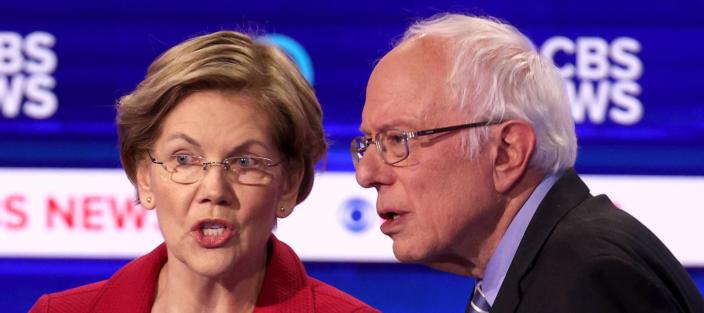
It’s not just investors who don’t like rate hikes. High-ranking politicians are asking the Fed to think twice about raising interest rates, too.
In a scathing letter to Fed Chairman Jerome Powell, a group of 11 lawmakers — including Senator Elizabeth Warren and Senator Bernie Sanders — criticized his commitment to ‘act aggressively’ on rate hikes even if ‘no one knows’ whether the process would lead to a significant recession.
“These statements reflect an apparent disregard for the livelihoods of millions of working Americans, and we are deeply concerned that your interest rate hikes risk slowing the economy to a crawl while failing to slow rising prices that continue to harm families.”
But on Wednesday, the U.S. central bank announced a 75 basis point increase to its benchmark lending rate to a new target range of 3.75% to 4%, marking the fourth three-quarter point hike in a row.
The S&P 500 dropped 2.5% on Wednesday, widening its year to date loss to 22%.
Of course, not all assets react to rate hikes in the same way. Some — like the three listed below — might be able to perform well even if the Fed doesn’t soften its hawkish stance.
It may seem counterintuitive to have real estate on this list. When the Fed raises its benchmark interest rates, mortgage rates tend to go up as well, so shouldn’t that be bad for the real estate market?
While it’s true that mortgage payments have been on the rise, real estate has actually demonstrated its resilience in times of rising interest rates according to investment management company Invesco.
“Between 1978 and 2021 there were 10 distinct years where the Federal Funds rate increased,” Invesco says. “Within these 10 identified years, US private real estate outperformed equities and bonds seven times and US public real estate outperformed six times.”
The Fed is tightening its monetary policy to fight rampant inflation, and real estate happens to be a well-known hedge against inflation.
Why? Because as the price of raw materials and labor goes up, new properties are more expensive to build. And that drives up the price of existing real estate.
Well-chosen properties can provide more than just price appreciation. Investors also get to earn a steady stream of rental income.
But you don’t need to be a landlord to start investing in real estate. There are plenty of real estate investment trusts (REITs) as well as crowdfunding platforms that can get you started on becoming a real estate mogul.
Most businesses fear rising interest rates. But for certain financials, like banks, higher rates are a good thing.
Banks lend money at higher rates than they borrow, pocketing the difference. When interest rates increase, the spread for how much a bank earns typically widens.
Banking giants are also well-capitalized right now and have been returning money to shareholders.
In July, Bank of America boosted its quarterly dividend by 5% to 22 cents per share. In June, Morgan Stanley announced an 11% increase to its quarterly payout to $0.775 per share — and that’s after it doubled its quarterly dividend to $0.70 per share last year.
Investors can also get exposure to the group through ETFs like the SPDR S&P Bank ETF (KBE) and the Invesco KBW Bank ETF (KBWB).
Higher interest rates can cool down the economy when it’s running too hot. But the economy is not running too hot, and many fear that more rate hikes could lead to a recession.
That’s why investors may want to check out recession-proof sectors — like consumer staples.
Consumer staples are essential products such as food and drinks, household goods, and hygiene products.
We need these things regardless of how the economy is doing or what the federal funds rates are.
When inflation drives up input costs, consumer staples companies — particularly those with entrenched market positions — are able to pass those higher costs onto consumers.
Even if a recession hits the U.S. economy, we’ll probably still see Quaker Oats and Tropicana orange juice — made by PepsiCo (PEP) — on families’ breakfast tables. Meanwhile, Tide and Bounty — well-known brands from Procter & Gamble (PG) — will likely remain on shopping lists across the nation.
You can gain access to the group through ETFs like the Consumer Staples Select Sector SPDR Fund (XLP) and the Vanguard Consumer Staples ETF (VDC).
The Federal Inland Revenue Service (FIRS) has begun its recruitment exercise for experienced professionals to…
Primate Elijah Ayodele Unveils 94-Page Prophecy for 2025, Makes Striking Predictions About Nigeria’s Political and…
The Senior Special Assistant to President Bola Tinubu on Community Engagement (North Central), Abiodun Essiet,…
The Minister of Information and National Orientation, Mohammed Idris, has warned politicians against linking stampedes…
Tobi Adegboyega, founder of the Salvation Proclaimers Anointed Church (SPAC Nation), has stated that he…
The Independent Petroleum Marketers Association of Nigeria has said that petrol is going to sell…